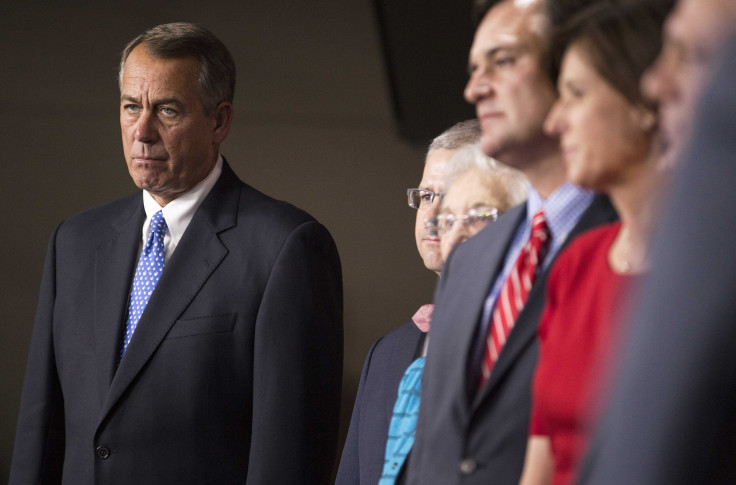Immigration Politics: Republicans Weigh Political Cost Of A Shutdown

WASHINGTON – We've seen this drama before. President Barack Obama is fighting with Republicans -- who are fighting among themselves. This time the issue is immigration, not the Affordable Care Act. But the players, the script, and the sound and fury are familiar.
Conservatives are pushing House Speaker John Boehner. GOP rank and file is angry and in no mood to compromise. A fiscal deadline must be met. Boehner said on Thursday that everything is “on the table” if Obama moves forward with his plan to use executive action to prevent the deportation of 5 million immigrants. Republicans have said they are willing to use the bill that's needed to keep the government open beyond Dec. 11 as a way to block the president's plans.
Before they go ahead and force a government shutdown, the GOP has to calculate the potential political costs.
Republicans are divided on the question. Some of those who argued against the government shutdown last year see a liability if they create another. Polls at the time showed that the public blamed the GOP for the crisis. But other Republicans make the case that the midterms show there was no permanent damage done from closing the government for 16 days. In fact, given that the Republicans picked up House seats and won the Senate, it could be argued that hanging tough pays off.
“You still have a full distribution of different beliefs on shut down, not just within political circles at large within Washington, but within the caucus,” Rep. Mark Sanford, R-S.C., said. “I think that you have some still very, very fearful of a shutdown and others, frankly, who don’t believe it would be the worst thing in the world.”
Sanford, who often aligns himself with the conservative wing of his party, doesn't see the standoff going all the way to a shutdown.
“I think there is still a general level of discomfort and ill-ease in both policy and political terms with the idea of shutdown,” Sanford said. “I think at the end of the day you will see it avoided.”
Mitch McConnell, who will become Senate majority leader in January, may be the shutdown scenario's most powerful opponent. "We will not be shutting the government down or threatening to default on the federal debt," he said Thursday -- just hours before Boehner said he would fight "tooth and nail" to keep Obama from moving ahead on his immigration policies.
The Republican right is likely to bring heavy pressure on Boehner to stand firm against Obama on immigration. And as the speaker knows from last year, when he tried to reach a "grand bargain" with the president on the budget and almost lost his speakership to a mutiny by conservatives, failing to hold fast can be dangerous for your career.
The immigration fight is a preview of -- and in some ways a proxy for -- the internal battles for control of the divided GOP that are likely to shape what goes on in Washington for the next two years. Both the moderates and the hard right will be trying to build alliances and watching to see what party members they can count on in a fight.
Rep. Steve King, R-Iowa, has been one of the most aggressive opponents of "amnesty" for undocumented immigrants. He has written legislative language that could be attached to a spending bill that would defund the president’s efforts.
Steve King said he hadn't been a fan of using a shutdown to fight Obamacare last year.
“I knew that it would end the way it ended," he said. "But I think we got a good result out of it at the end, and we should not fear a confrontation with the president. The president is weaker now than he’s ever been."
“We will need to challenge him. He didn’t learn anything from this election.”
Conservative Rep. John Fleming, R-La., said he just wants the president to wait and not act unilaterally -- but if necessary, he's ready for battle.
“I support anything we can do to block amnesty, executive amnesty," he said. "And if we have to have a fight over it, we’re going to have to have a fight over it.”
Still, some across the aisle are predicting -- or maybe just hoping -- that the non-shutdown crowd will win.
“Mitch McConnell and John Boehner both know that nobody wins with a government shutdown,” said retiring Rep. Jim Moran, D-Va. “It doesn’t help anyone and I think both parties get blamed. That’s why I don’t think there is going to be a government shutdown.”
House Appropriations Committee Ranking Member Rep. Nita Lowey, D-N.Y., said work is still continuing behind the scenes to craft an “omnibus” bill, which would fund the government through September 2015. “We do believe there is going to be an omnibus and certainly [Kentucky Rep.] Hal Rogers and Mitch McConnell are focused on an omnibus,” Lowey said.
At least the Democrats, by and large, will have to negotiate only with the other party. Republicans have to contend with their own civil war as well.
© Copyright IBTimes 2024. All rights reserved.












